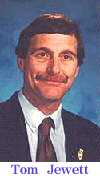'The Review' - Authors Of The American Experience
Another star-studded cast of authors highlights our initial edition of the new millenium. I hope their writing opens up new vistas of the early American experience for you, as they did for me. Gilbert Doré offers us an intriguing article on the Loyalist alternative to the American Revolution. Parliamentary sovereignty was their downfall, claims author Doré, who sets forth the ideology of three leading lights of the Loyalist cause to make his point. An adjunct faculty member of the University of Quebec, Doré (gildore@sympatico.ca) is the author of several articles on congressional decision-making and U.S. foreign relations.
Gilbert Doré offers us an intriguing article on the Loyalist alternative to the American Revolution. Parliamentary sovereignty was their downfall, claims author Doré, who sets forth the ideology of three leading lights of the Loyalist cause to make his point. An adjunct faculty member of the University of Quebec, Doré (gildore@sympatico.ca) is the author of several articles on congressional decision-making and U.S. foreign relations.
 Thomas Jefferson, the head of the U.S. Patent Office? That's what Professor Tom Jewett says in his narrative on Jefferson. Of course, it's all there in black and white, dutifully passed and adjudicated by Congress in 1790-- adding another in a long list of accomplishments to the multi-talented Oracle of Virginia. In his article Professor Jewett (tjewett@siue.edu), associate professor at Southern Illinois University at Edwardsville, explains how Jefferson's vision of protecting the rights of the inventor and the common man are principles of the Patent Office today.
Thomas Jefferson, the head of the U.S. Patent Office? That's what Professor Tom Jewett says in his narrative on Jefferson. Of course, it's all there in black and white, dutifully passed and adjudicated by Congress in 1790-- adding another in a long list of accomplishments to the multi-talented Oracle of Virginia. In his article Professor Jewett (tjewett@siue.edu), associate professor at Southern Illinois University at Edwardsville, explains how Jefferson's vision of protecting the rights of the inventor and the common man are principles of the Patent Office today.
 Correspondence between George Washington, the Marquis de Lafayette and members of the Continental Congress forms the backdrop to Dean Engle's paper on Lafayette's dual role of French engagement during the three-year period between 1777 and 1780. Son of a French mother and an American father, author Engle (engle@mmgnet.com) developed his interest in Lafayette from his collection of Colonial War texts from both sides of the Atlantic.
Correspondence between George Washington, the Marquis de Lafayette and members of the Continental Congress forms the backdrop to Dean Engle's paper on Lafayette's dual role of French engagement during the three-year period between 1777 and 1780. Son of a French mother and an American father, author Engle (engle@mmgnet.com) developed his interest in Lafayette from his collection of Colonial War texts from both sides of the Atlantic.
In his first appearance in The Early America Review, John Hoey offers an article that punctures a myth that has been promulgated to generations of students. Namely, that outnumbered U. S. forces fought valiantly against a superior opponent during the War of 1812 and, against all odds, won. That victory, the myth continues, spurred the young Republic on to greater growth and glory. Not so, says Hoey (jbhoey@webtv.net) , a Ph.D. candidate in U.S. History at New York University. For the real story behind the myth, you are invited to turn to John Hoey's article, Federalist Opposition to the War of 1812.
A fascinating account of the early Virginia river trade comes to The Review by way of Dian McNaught. Captain of the Rose of Nelson Batteau, McNaught describes the development of the batteau as instrumental in the expansion of trade up and down the Virginia coast during the 1700s. An accomplished inkle-weaver, author McNaught regularly attends a rendezvous in the manner of our forebears to trade, barter and socialize. For information on participating in early America's "living history," contact Ralph Smith at ralph@mail.hipeak.com.
 Real students of the Revolutionary War don't need a refresher course when the conversation turns to such battle-grounds as King's Mountain, Blue Licks and the campaign to Vincennes. But how about the rest of us? As usual, Professor James Pierce (jpierce@sos.net) has come to the rescue, again, in his descriptive accounts of the battles waged on early America's frontiers. All the storied figures of those historic engagements are here-- Simon Girty, John Sevier, Patrick Ferguson, Daniel Boone and George Rogers Clark. Read their exploits on a stage larger-than-life in Frontier Battles of the Revolution. James T. Pierce is on the faculty of Skagit Valley Community College in Mt. Vernon, Washington.
Real students of the Revolutionary War don't need a refresher course when the conversation turns to such battle-grounds as King's Mountain, Blue Licks and the campaign to Vincennes. But how about the rest of us? As usual, Professor James Pierce (jpierce@sos.net) has come to the rescue, again, in his descriptive accounts of the battles waged on early America's frontiers. All the storied figures of those historic engagements are here-- Simon Girty, John Sevier, Patrick Ferguson, Daniel Boone and George Rogers Clark. Read their exploits on a stage larger-than-life in Frontier Battles of the Revolution. James T. Pierce is on the faculty of Skagit Valley Community College in Mt. Vernon, Washington.
Popular Cities
Popular Subjects
Pre-Calculus for Business Tutors
Pharmaceutical Sciences Tutors
AP World History Tutors
2nd Grade Science Tutors
SQL Tutors
ACL Analytics Tutors
Chemistry Tutors
Iranian History Tutors
Endocrinology Tutors
Quantum Chemistry Tutors
Human Resources Tutors
Urban Planning Tutors
UK A Level French Tutors
Physics Tutors
German Tutors
Computer Science Tutors
Marketing Tutors
GMAT Tutors
CLEP French Tutors
NASM - National Academy of Sports Medicine Tutors
